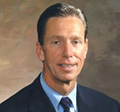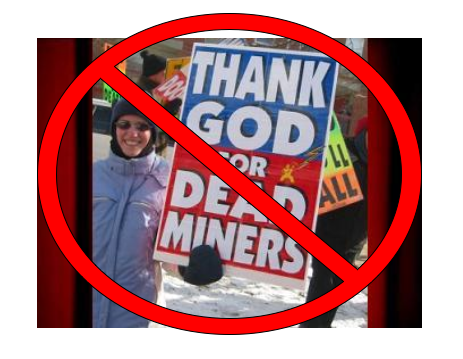This is a personal account, written by Megan Naylor, student at Appalachian State University and superstar volunteer for Appalachian Voices. She became motivated to help end mountaintop removal when she visited Larry Gibson at his home on Kayford Mountain in West Virginia to documented the process and effects of mountaintop removal. Larry Gibson is a hero in the movement to end mountaintop removal mining. He has been able to protect 50 acres of his land which is surrounded by a 7000 acre mountaintop removal mine, which he uses as a education center for visitors from all across the country. He has been a victim of violence on his property and we are raising funds for a security system to protect him and visitors to Kayford Mountain.
 As Earth Day nears I can’t help but remember the first time I had the pleasure to meet Larry Gibson. This “Keeper of the Mountains” introduced me to the ugly truth regarding destruction of the Appalachian Mountains fueled by greed.
As Earth Day nears I can’t help but remember the first time I had the pleasure to meet Larry Gibson. This “Keeper of the Mountains” introduced me to the ugly truth regarding destruction of the Appalachian Mountains fueled by greed.
Two months after contacting Larry, I found myself driving up the steep dirt road leading to his cabin and wondered what to expect. I planned my trip based on only a few conversations with him over a bad phone connection.
When we first met he was in overalls, grinning from ear to ear as he welcomed me, shaking my hand midstride while simultaneously insisting I make myself at home.
In his terms that meant filling my plate high with samples from covered dishes fresh from the oven of family and friends gathering to hear him talk about the mountains.
Over the next two days in a humble but unwavering tone he shared not just his story but also his home and heart with me. Larry, with his dog Bear in tow, opened my eyes and inspired me to make a difference.
 I’ll never forget him showing me where a spring once bubbled up from the earth behind his cabin and talking about how different things had became when one day the spring simply stopped.
I’ll never forget him showing me where a spring once bubbled up from the earth behind his cabin and talking about how different things had became when one day the spring simply stopped.
He walked me between neat lines of headstones in the only family graveyard he had left on his land. Small American flags placed into the ground fluttered in the breeze as he pointed to a pile of rubble in the distance marking where his family’s other graveyard had once stood before it was blown up to access the coal seams beneath.
It made me realize how blessed I am and how precious life is. To me Larry is an image of solidarity in a sometimes uncertain world. He continues to inspire me as he has thousands of others.
He ask everyone he meets: “What do you hold so dear that you don’t have a price on it? For me it is these mountains, and we must fight for them.”
Larry does not ask people to help end mountaintop removal, he insists on it.
I hope everyone can join us on Earth Day to raise the funds Larry needed to get the security system needed to make him and Kayford Mountains safe. If you can’t join us, donate. You could win a Vespa scooter!
Dig deep and come party for a good cause. Hope to see you there.



 Rep. John Adler is a 1st term Democrat from New Jersey 3rd District, and is the 168th member of the U.S. House of Representatives (including Rep. Pallone) to cosponsor the Clean Water Protection Act (HR1310). Rep. Adler serves on the Financial Services, and Veterans Affairs committee’s.
Rep. John Adler is a 1st term Democrat from New Jersey 3rd District, and is the 168th member of the U.S. House of Representatives (including Rep. Pallone) to cosponsor the Clean Water Protection Act (HR1310). Rep. Adler serves on the Financial Services, and Veterans Affairs committee’s. Rep. Stephen Lynch is a 5th term Democrat from Massachusetts 9th District and the 169th cosponsor of the Clean Water Protection Act. Rep. Lynch serves on the Financial Services committee, and the Oversight and Government Reform committee where he is the chairman of the Federal Workforce, Postal Service, and the District of Columbia subcommittee.
Rep. Stephen Lynch is a 5th term Democrat from Massachusetts 9th District and the 169th cosponsor of the Clean Water Protection Act. Rep. Lynch serves on the Financial Services committee, and the Oversight and Government Reform committee where he is the chairman of the Federal Workforce, Postal Service, and the District of Columbia subcommittee. Rep. Martin Heinrich is a 1st term Democrat from New Mexico’s 1st District, and signed on as the 170th cosponsor. Mr. Heinrich serves on the Armed Services, and Natural Resources committees.
Rep. Martin Heinrich is a 1st term Democrat from New Mexico’s 1st District, and signed on as the 170th cosponsor. Mr. Heinrich serves on the Armed Services, and Natural Resources committees.
 After intense pressure from Ohio Citizen Action, and other constituents, Senator Sherrod Brown from the coal state of Ohio officially became the 11th cosponsor of SB 696, the
After intense pressure from Ohio Citizen Action, and other constituents, Senator Sherrod Brown from the coal state of Ohio officially became the 11th cosponsor of SB 696, the 

 No one except the crazy, misguided people at
No one except the crazy, misguided people at 